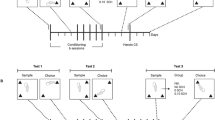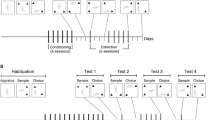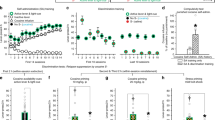Abstract
THE abuse potential of marihuana has been widely debated as the use of the drug has increased in Western countries. Overton1 has suggested that the abuse potential of various drugs may parallel their capacity for producing “state-dependent” effects in animals and man. State-dependent or “dissociated” learning refers to a phenomenon observed in animal and human studies wherein certain behaviour learned in particular drug states transfers more readily when the same drug state is reintroduced than if subsequent testing occurs under the influence of another drug or in a non-drug state2–8. This phenomenon has been demonstrated primarily with sedative and hypnotic drugs, such as barbiturates and alcohol, which are relatively susceptible to abuse. In general, drugs with little abuse potential (for example phenothiazines) dissociate weakly or not at all1.
This is a preview of subscription content, access via your institution
Access options
Subscribe to this journal
Receive 51 print issues and online access
$199.00 per year
only $3.90 per issue
Buy this article
- Purchase on Springer Link
- Instant access to full article PDF
Prices may be subject to local taxes which are calculated during checkout
Similar content being viewed by others
References
Overton, D. A., in The Biology of Alcoholism, 2, Physiology and Behaviour (edit. by Kissin, B., and Begleiter, H.) (Plenum, New York-London, 1972).
Steinberg, H., Brit. J. Psychol., 47, 183 (1956).
Overton, D. A., in Psychopharmacology, A Review of Progress 1957-1967 (edit. by Efron, D., Cole, J., Levine, J., and Wittenborn, J.) (US Government Printing Office, Washington, DC, 1969).
Goodwin, D. W., Powell, B., Bremer, D., Hoine, H., and Stern, J., Science, 163, 1358 (1969).
Greenberg, R., Mahler, D., and Pearlman, C., Arch. Gen. Psychiat., 21, 691 (1969).
Seigel, R. K., and Jarvik, M. E., Psychon. Sci., 25, 260 (1971).
Fischer, R., J. Psychedelic Drugs, 3, 31 (1971).
Ley, P., Jain, V., Swinson, R., Eaves, D., Bradshaw, P., Kincey, J., Crowder, R., and Abiss, S., Brit. J. Psychiat., 120, 511 (1972).
Barry, H., and Kubena, R. K., in Drug Addiction: Experimental Pharmacology, 1, 3 (Futura, Mt Kisco, New York, 1972).
Renault, P., Schuster, C., Heinrich, R., and Freemon, D., Science, 174, 589 (1971).
Marks, L. E., and Miller, G. A., J. Verb. Learn. Verb. Behav., 3, 1 (1964).
Palermo, D. S., and Jenkins, J. J., in Word Association Norms: Grade School through College (University of Minnesota Press, Minneapolis, 1964).
Kahn, T. C., in Manual for the Kahn Test of Symbol Arrangements (Western Psychological Services, Beverley Hills, 1953).
Melges, F., Tinklenberg, J., Hollister, L., and Gillespie, H., Science, 168, 1118 (1970).
Author information
Authors and Affiliations
Rights and permissions
About this article
Cite this article
HILL, S., SCHWIN, R., POWELL, B. et al. State-dependent Effects of Marihuana on Human Memory. Nature 243, 241–242 (1973). https://doi.org/10.1038/243241a0
Received:
Revised:
Issue Date:
DOI: https://doi.org/10.1038/243241a0
This article is cited by
-
Hashish extract impairs retention of defeat-induced submissive behavior in mice
Psychopharmacology (1985)
-
The effects of mood variation on state-dependent retention
Cognitive Therapy and Research (1984)
-
State-dependent learning in children receiving methylphenidate
Psychopharmacology (1982)
-
Effect of diazepam and chlorpromazine on memory functions in man
European Journal of Clinical Pharmacology (1978)
-
A test of state dependency effects in marihuana intoxication for the learning of psychomotor tasks
Psychopharmacologia (1976)
Comments
By submitting a comment you agree to abide by our Terms and Community Guidelines. If you find something abusive or that does not comply with our terms or guidelines please flag it as inappropriate.



